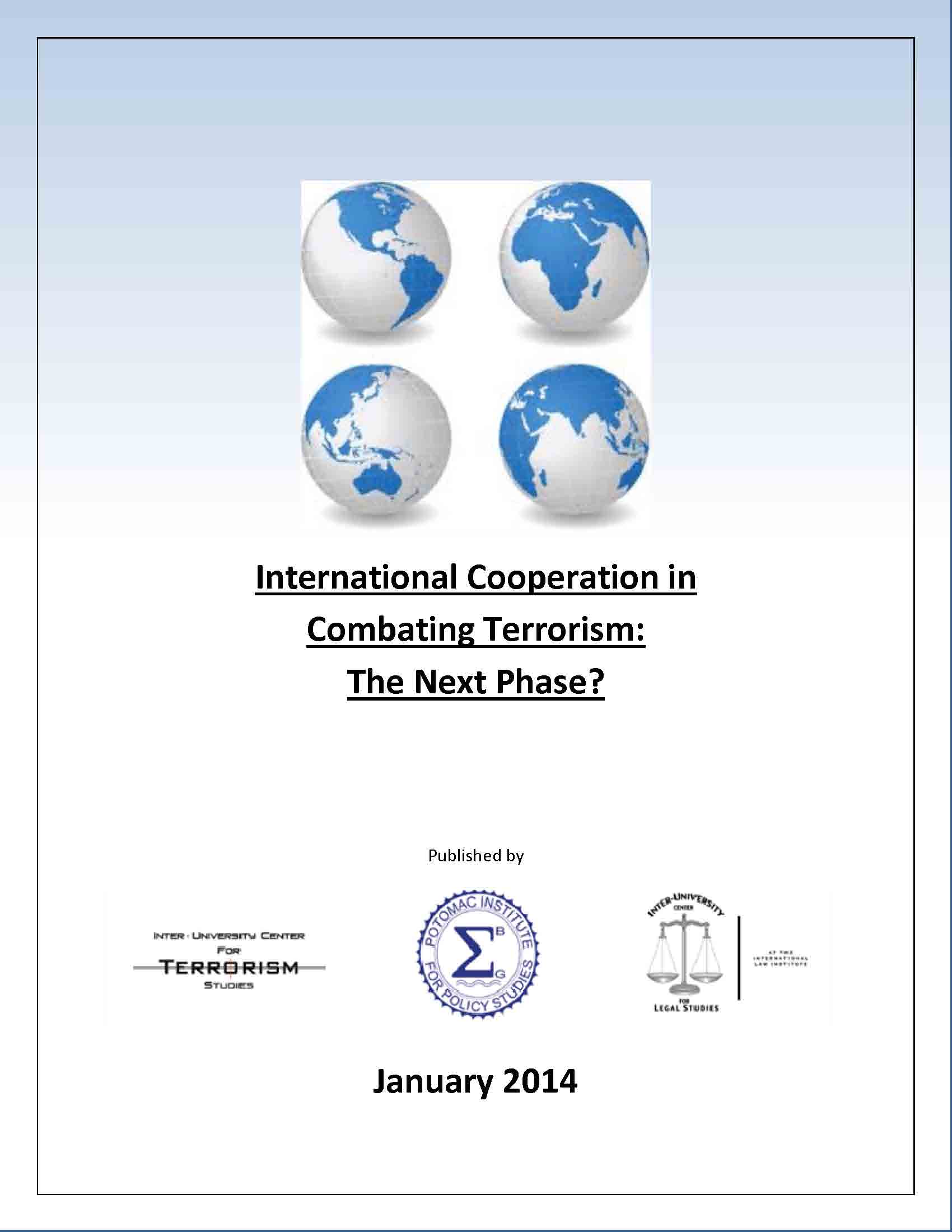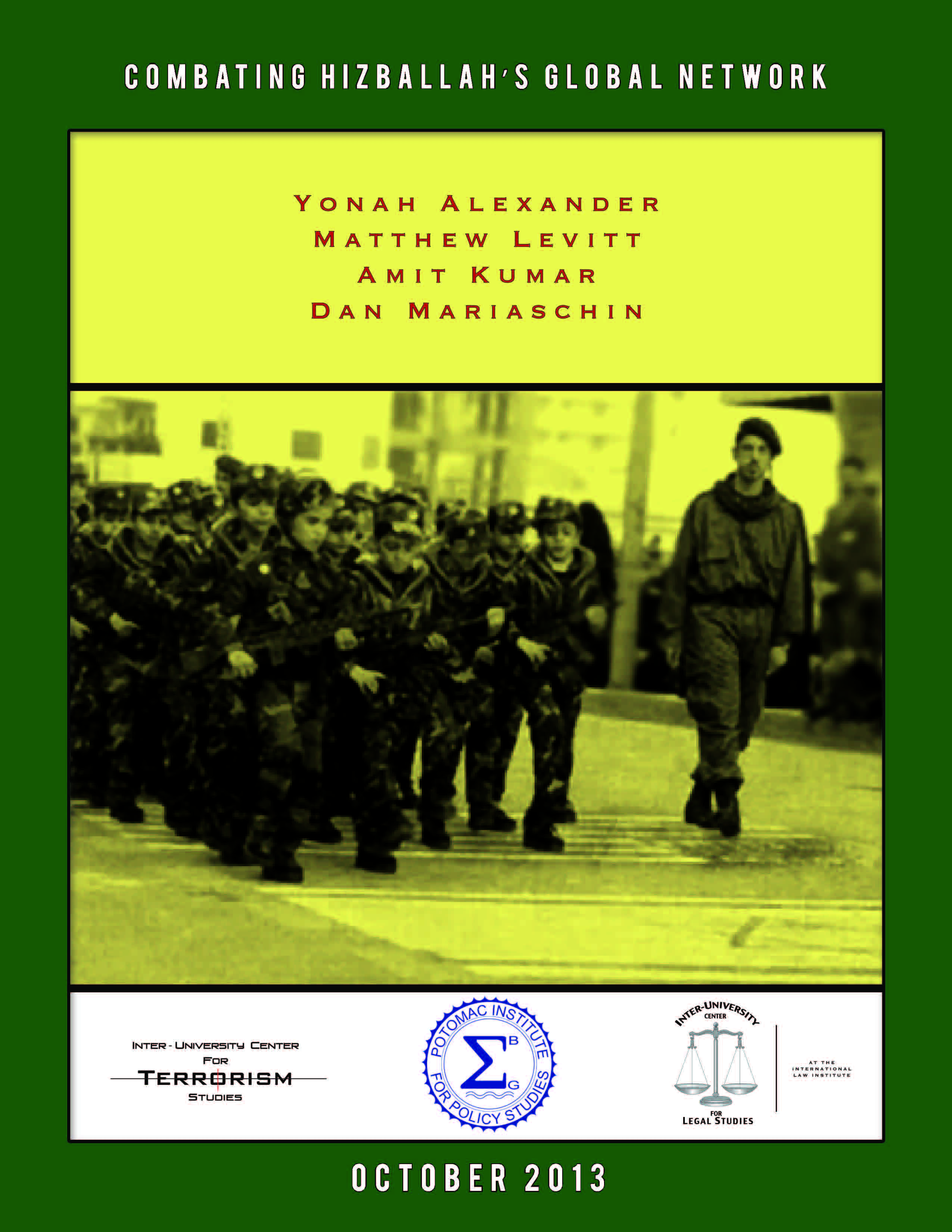Publications
On February 17, 2015 the Inter-?University Center for Terrorism Studies (IUCTS) published its sixth annual report, “Terrorism in North Africa and the Sahel in 2014,” authored by Prof. Yonah Alexander, Director-?IUCTS. The report finds the region & global community facing the most serious security challenges since 9/11, from natural and man-?made threats ranging from Ebola to extremism. The rise of the so-?called 'Islamic State' and resilience of al-?Qaida & affiliates contributed to a 25% jump in terrorist attacks in N. Africa & the Sahel in 2014, the highest level since 9/11. The study recommends the US & allies engage more effectively to slow a security crisis that is erupting across Africa’s “arc of instability."
 In 2013 terrorism has continued to challenge global stability and security. It represented the highest annual total of attacks since 9/11. The role of international cooperation in combating terrorism has therefore become more critical than ever before.
In 2013 terrorism has continued to challenge global stability and security. It represented the highest annual total of attacks since 9/11. The role of international cooperation in combating terrorism has therefore become more critical than ever before.
A new report titled "International Cooperation in Combating Terrorism: The Next Phase?" provides the context and discussion on this important topic, based on a seminar that highlighted security concerns of the League of the Arab States, African countries, and the European Union during the sixty-eighth session of the U.N. General Assembly.
To assess the various strategic efforts both regionally and inter-regionally, a group of diplomats discussed past lessons and future outlook during a seminar held on September 27, 2013 at the Potomac Institute for Policy Studies.
The event was co-sponsored by the Inter-University Center for Terrorism Studies, the Inter-University Center for Legal Studies, at the International Law Institute and the Center for National Security Law, University of Virginia School of Law.
Prof. Alexander provided the introduction, both in the seminar and in the report. The remainder of the report contains the presentations by:
Ambassador Dr. Mohammed R. Al Hussaini Al Sharif, Chief Representative Of the League of Arab States in Washington D.C.
Ambassador Al Maamoun Baba Lamine Keita, Ambassador of the Republic of Mali to the United States
Simonas Satunas, Deputy Chief of Mission Embassy of Lithuania
Abderrahim Rahhaly, Deputy Chief of Mission Embassy of the Kingdom of Morocco
Download the full pdf here.
 In light of the growing debate over the Geneva deal with Iran, the tactical and strategic role of Hizballah, Tehran’s major terrorist proxy in the Middle East and beyond, is becoming more critical for any future diplomatic negotiations.
In light of the growing debate over the Geneva deal with Iran, the tactical and strategic role of Hizballah, Tehran’s major terrorist proxy in the Middle East and beyond, is becoming more critical for any future diplomatic negotiations.
The new timely publication on “Combating Hizballah’s Global Network” provides an updated reality-check on the nature and potential challenges of Iran’s most effective terrorist tool in the coming months and years. It was co-authored by Professor Yonah Alexander (Director, Inter-University Center for Terrorism Studies), Dr. Matthew Levitt (Director, Stein Program on Counterterrorism and Intelligence, Senior Fellow, Washington Institute for Near East Policy), Professor Amit Kumar (Edmund A. Walsh School of Foreign Service, Georgetown), and Dan Mariaschin (Executive Vice President at B'nai B'rith International).
The just released report focuses on Hizballah’s ideology, objectives, organizational structures, major terrorist activities around the world, the Iranian connection, and what the international community, particularly the United States and Europe can do to confront the growing threat to all societies.
 Two major security and stability challenges are facing contemporary societies in Africa and elsewhere. The first stems from natural disasters such as earthquakes, famine, drought, and wildfires. The second is man-made threats, including crime, piracy, terrorism, ethnic and religious strife, and war.
Two major security and stability challenges are facing contemporary societies in Africa and elsewhere. The first stems from natural disasters such as earthquakes, famine, drought, and wildfires. The second is man-made threats, including crime, piracy, terrorism, ethnic and religious strife, and war.
Starting in the late 1960’s and subsequent three decades, the Institute for Studies in International Terrorism (ISIT), initially administered by the State University of New York system, in collaboration with educational bodies in the US and abroad, conducted academic work dealing with Africa’s security concerns and their global implications. For instance, in the early 1980’s ISIT, in cooperation with the Center for Strategic and International Studies at Georgetown University, the Institute for Social and Behavioral Pathology at the University of Chicago, and the University of Abadan in Nigeria, was awarded a Rockefeller Foundation grant to scholars from around the world to conduct a cooperative study on exploring solutions to conflicts in Africa and elsewhere. This project resulted in a publication of the book International Violence co-edited by Tunde Adeniran and Yonah Alexander (Praeger 1983).
Since that early academic effort, numerous seminars, conferences, and publications have been undertaken by the Inter-University Center for Terrorism Studies (IUCTS), a consortium of universities and think tanks in more than 40 countries. This entity was subsequently administered by the Terrorism Studies program at George Washington University, and for the past 15 years by the International Center for Terrorism Studies (ICTS) at the Potomac Institute for Policy Studies in Arlington, Va. and the Inter-University Center for Legal Studies (IUCLS) at the International Law Institute (ILI) in Washington, D.C.
The current study, “Terrorism in North Africa and the Sahel in 2013,” published in January 2014 by IUCTS, represents the Fifth Annual Report focusing on terrorist threats in the Maghreb—Algeria, Libya, Mauritania, Morocco, and Tunisia—as well as adjacent areas of the Sahel—Chad, Mali, Niger—and their strategic security implications regionally and globally. The first Special Report in this series “Why the Maghreb Matters: Threats Opportunities & Options for Effective U.S. Engagement in North Africa” was published by the Potomac Institute for Policy Studies and Conflict Management Program at the Johns Hopkins University School of Advanced International Studies on March 31, 2009. This initial study was guided by a bipartisan panel of experts, including former Secretary of State Madeline Albright, General (ret.) Wesley Clark, Ambassador (ret.) Stuart Eizenstat, Professor William Zartman, and other distinguished former officials and academics. The panel recommended more effective engagement in the region to prevent the brewing security crisis from erupting in the region and beyond.
This fundamental recommendation was also underscored in subsequent annual reports published in 2010, 2011, and 2012, which contained alarming statistics on the growing “arc of stability” in the region. The 2013 study hopefully provides data and analysis required for policymakers to unilaterally and collectively develop coherent and realistic strategies to combat the global expansion of terrorism.
Download the full pdf here.
 Professor Yonah Alexander, Ph.D., Member, Board of Regents, Senior Fellow, and Director, International Center for Terrorism Studies presents a new report on Terrorism in North Africa and the Sahel: Global Reach and Implications.
Professor Yonah Alexander, Ph.D., Member, Board of Regents, Senior Fellow, and Director, International Center for Terrorism Studies presents a new report on Terrorism in North Africa and the Sahel: Global Reach and Implications.
Download the full pdf here.

